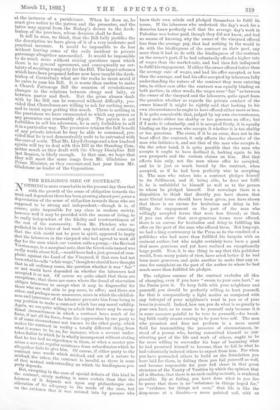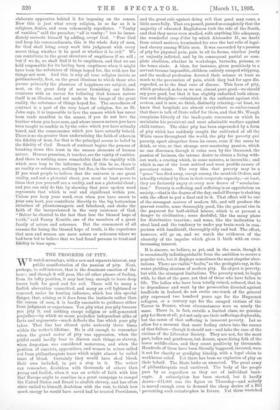THE RELIGIOUS SIDE OF CONTRACT.
NOTHING is more remarkable in the present day than that with the growth of the sense of obligation towards the weak and dependent there has been growing almost pan i passu a depreciation of the sense of obligation towards those who are suPposed to be strong and independent,—though it is, of course, quite impossible for any class in modern society, however well it may be provided with the means of living, to be really independent of the fidelity and trustworthiness of the rest of the community. Even Mr. Fletcher, who re- pudiated in his letter of last week any intention of asserting that the rich could not be poor in spirit, appeared to imply that the labourers in the vineyard who had agreed to work all day for the sum which our version calls a penny,—the Revised Version says, in a marginal note, that the Greek coin named was really worth about Si d.,--would have had a just ground of com- plaint against the Lord of the Vineyard, if that sum had not been what he calls " a fair wage," though we should have thought that in all ordinary cases, the question whether it was " fair " Or not would have depended on whether the labourers had accepted it or not. Of course we quite admit that them are exceptions ; that there are cases where the dread of starvation Obliges labourers to accept what it may be disgraceful for those who are well able to pay more, to offer; and there are other, and perhaps more numerous, oases in which the childish- ness and ignorance of the labourer prevents him from being in any Position to make a contract which has any moral validity. Again, we are quite willing to admit that there may be excep- tional oircumstancea in which a contract loses much of its force, if not all its force, from the suppression by one party to it of some circumstance not known to the other party, which makes the contract in reality a totally different thing from what it seems to be, as, for instance, when a servant under- takes duties to which be is wholly incompetent without stating that he has had no experience in them, or when a master pro- mises a servant regular assistance from subordinates which he altogether fails to give him. Of course, if either party to the contract uses words which mislead, and are of a nature to mislead, the other, the contract is invalid, as there is none of at mutual understanding on which its bindingness pro- perly depends.
But, excepting in the case of special defects of this kind in the contract, surely nothing is more certain than that the fairness of it depends not upon any philanthropic con- sideration of its adequacy to the needs of the case, but on the evidence that it was entered into by persons who
knew their own minds and pledged themselves to fulfil its terms, If the labourers who undertook the day's work for a denarius knew perfectly well that the average day's work in Palestine was better paid, though they did not know, and had no means of knowing, why the owner of the vineyard offered less than the average pay, that had nothing in the world to do with the bindingness of the contract on their part, any more than it had to do with the bindingness of the contract on the owner's part, if he had voluntarily offered a higher rate of wages than the market-rate, and had then felt indisposed to fulfil his engagement. If either the owner offered better than the average rate of wages, and had his offer accepted, or less than the average, and had his offer accepted by labourers fully understanding the nature of the contract they were entering into, in either case alike the contract was equally binding on both parties ; in other words, the wages were " fair "as between the owner of the vineyard and the labourers, quite apart from the question whether as regards the private conduct of the owner himself it might be rightly said that looking to his own circumstances he ought to have offered either more or less. It is quite conceivable that, judged by my own circumstances, I may make either too shabby or too generous an offer ; but if I make it voluntarily, and it is accepted freely, it is equally binding on the person who accepts it whether it is too shabby or too generous. The error, if it be an error, does not in the least affect the contract, it only affects the character of the man who initiates it, and not that of the man who accepts it. On the other hand, it is quite possible that the man who accepts it ought to have declined it, looking again to his own prospects and the various claims on him. But that affects him only, not the man whose offer he accepted, and he is just as much bound by the contract, when accepted, as if he had been perfectly wise in accepting it. The man who enters into a contract pledges himself to its fulfilment, and if, being able, he does not fulfil it, he is unfaithful to himself as well as to the person to whom he pledged himself. But nowadays there is a disposition to think that directly you have shown that more liberal terms should have been given, you have shown that there is an excuse for hesitation and delay in ful- filling the engagement on the part of the man who willingly accepted terms that were less liberal; or that, if you can show that over-generous terms were offered, there is an excuse for hesitation and delay in fulfilling his offer on the part of the man who offered them. Not long ago, we had a long controversy in the Press as to the conduct of a publisher who had more than fulfilled his bargain with an eminent author, but who might certainly have been a good deal more generous and yet have realised an exceptionally large profit. Now, it is one thing to say that this publisher would, from many points of view, have acted better if he had been more generous, and quite another to make that any ex- cuse for complaint on the part of the author to whom he had much more than fulfilled his pledges.
The religions essence of the contract excludes all idea of changing, even if you have "sworn to your own hurt," as the Psalm puts it. To keep faith with your neighbour and yourself, you should be perfectly willing to hurt yourself, for that is comparatively a light matter as compared with any betrayal of your neighbour's trust in you or of your trust in yourself. Indeed, how can you do what is so greatly to your own hurt, as to cease to be yourself only because it is in some measure painful to be true to yourself,—for break- ing faith really means ceasing to be your true self. The man who promises and does not perform is a mere moral fluid for transmitting the pressure of circumstances, in- stead of a person who, having committed himself to con- stituting part of the life and work of others, ought to be far more willing to surrender his hope of becoming what he had promised himself to become, than to fail in what he had voluntarily induced others to expect from him. For when you have persuaded others to build on the foundation you have laid for them, in failing them you fail yourself as well, and become responsible for your by hsilicahrtehe opintihnaiotngtrheaatt structure of the Vanity of Vanities y all is illusion, that there is no such reality as truth, is rendered plausible. By so failing, you have done what in you lies to prove that there is no "substance in things hoped for," no "evidence for things not seen," that life is like the drop-scene at a theatre,—a mere painted veil, with an elaborate apparatus behind it for imposing on the senses. Now this is just what every religion, in so far as it is religious, denies, and even vehemently repudiates. "Vanity of vanities," said the preacher, " all is vanity ; " but he imme- diately corrects himself by adding, except God. "Fear God and keep his commandments, this is the whole duty of man, for God shall bring every work into judgment with every Secret thing, whether it be good or whether it be evil." We can contribute to the great structure of emptiness if we will ; but if we do, we shall find it to be emptiness, and that we are held responsible for its having been emptiness when it might have been the substance of things hoped for, the evidi nee for things not seen. And this is why all true religion insists so pertinaciously, first, on the great illusions to which those who pursue primarily the phantom of happiness are subject, and next, on the great duty of never furnishing our fellow- creatures with an excuse for believing that human nature itself is an illusion, and not made in the image of the great reality, the substance of things hoped for. The sacredness of contract is a part of the very heart of religion, for, as St. John says, it is impossible to love the unseen which has never been made manifest to the senses, if you do not love the brother whom you have seen, and whose unseen nature you have been taught to confide in by the voice which you have actually heard, and the countenance which you have actually beheld. There is no sin greater than undermining the faith of others in the fidelity of man, for that is the principal access to belief in the fidelity of God, Breach of contract begins the process of breaking down this trust in the unseen elements of human nature, Human promises, it teaches, are the vanity of vanities. And there is nothing more remarkable than the rapidity with which men leap to the inference that, if this be so, there is no reality or substance, nothing but flux, in the universe itself. If you want people to believe that the universe is one great reality, and not a pictorial cheat, you must at least prove to them that you yourself are a reality, and not a pictorial cheat ; and you can only do this by showing that your spoken word represents that which is real and significant within you. Unless you keep your word, even when you have sworn to your own hurt, you contribute directly to the big bottomless structure of phantasmagoria and falsehood, and shake the faith of the inexperienced in the very existence of God. "Better be cheated to the last than lose the blessed hope of truth," said Fanny Kemble, one of the members of a great family of actors and actresses. But the commonest of all reasons for losing the blessed hope of truth, is the experience that men and women are mere actors or actresses where we had been led to believe that we had found persons to trust and fidelity to lean upon.



































 Previous page
Previous page